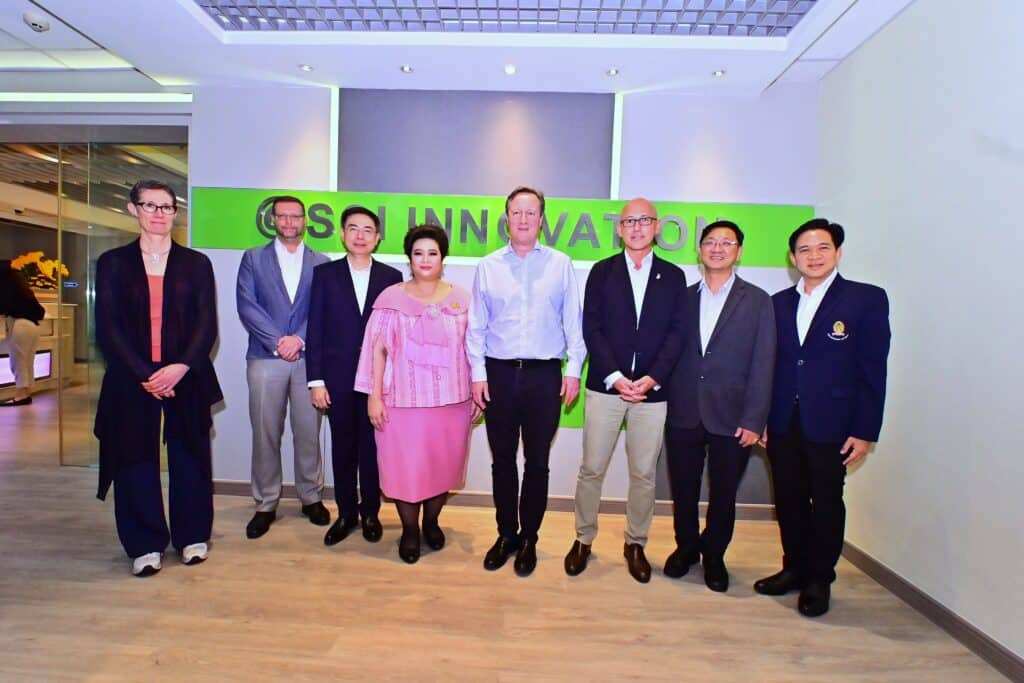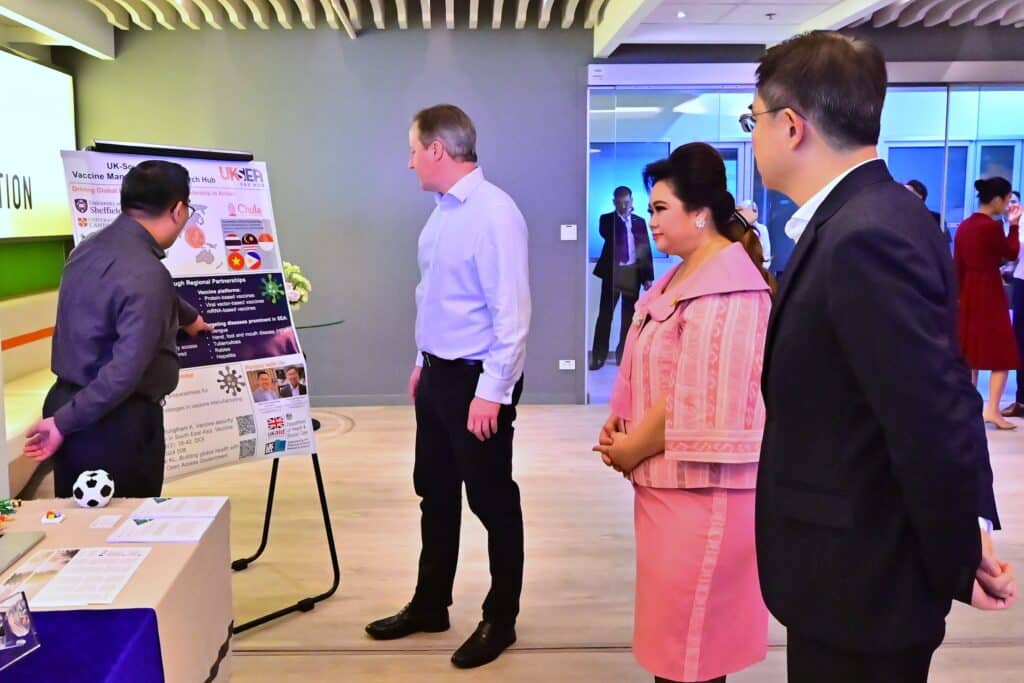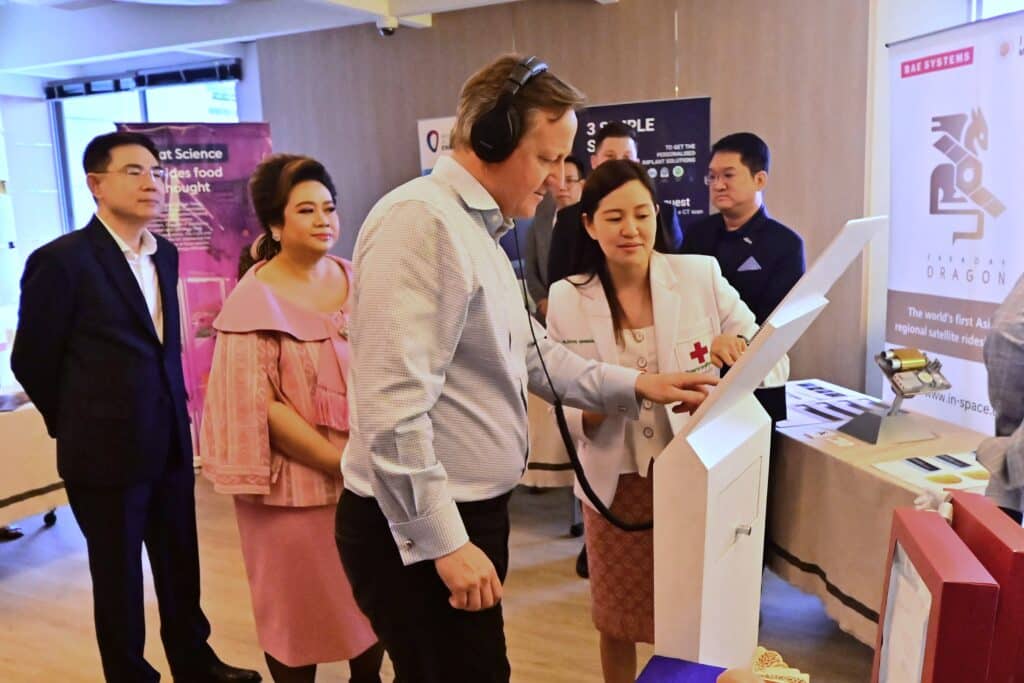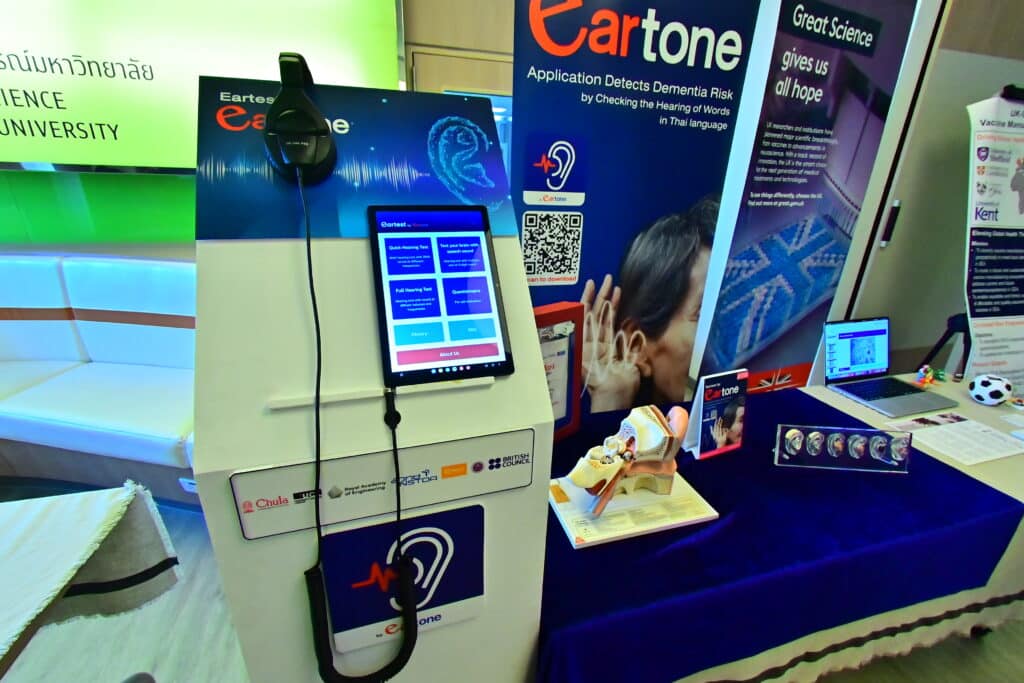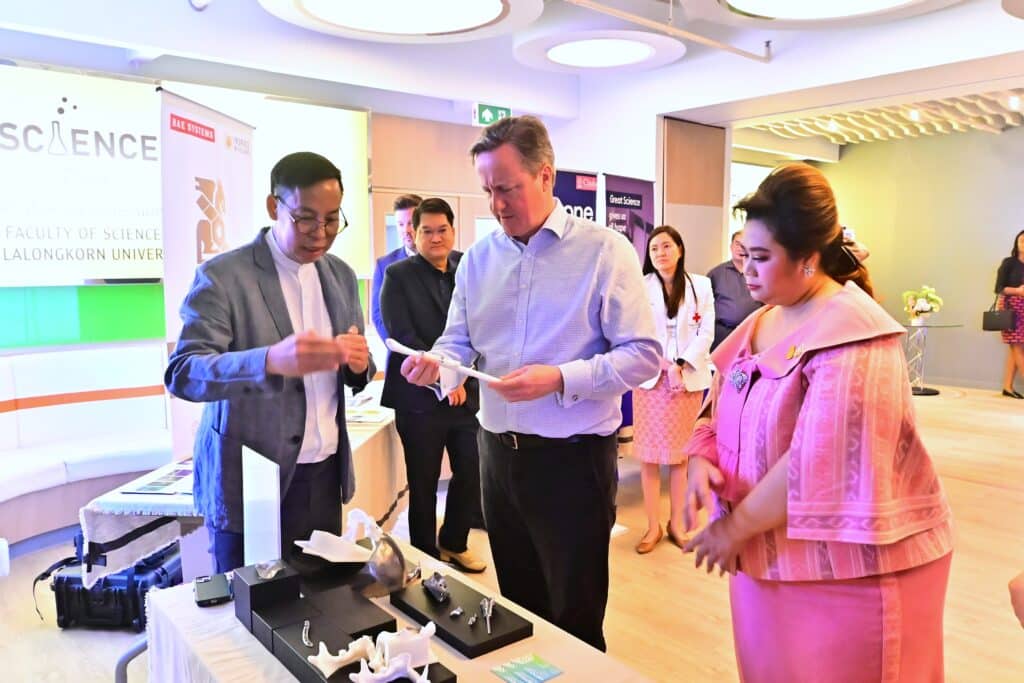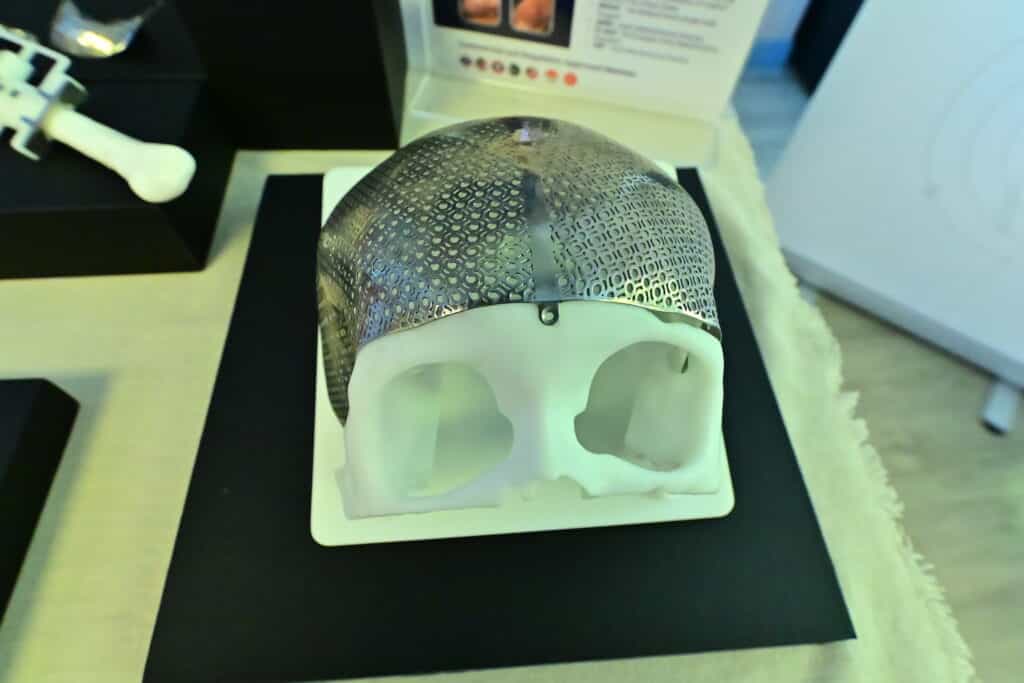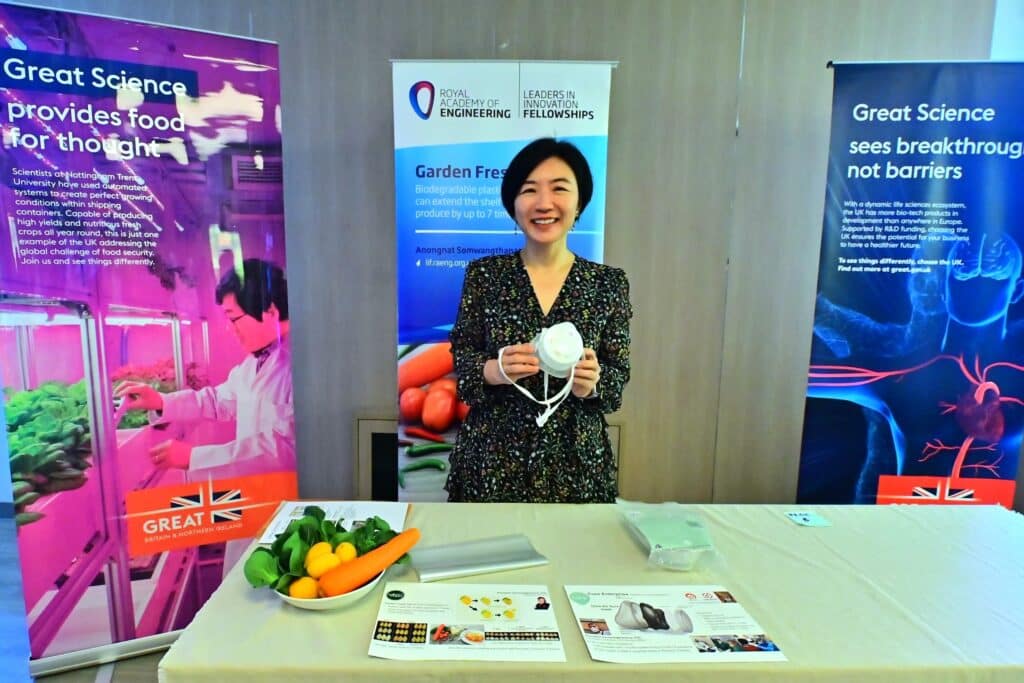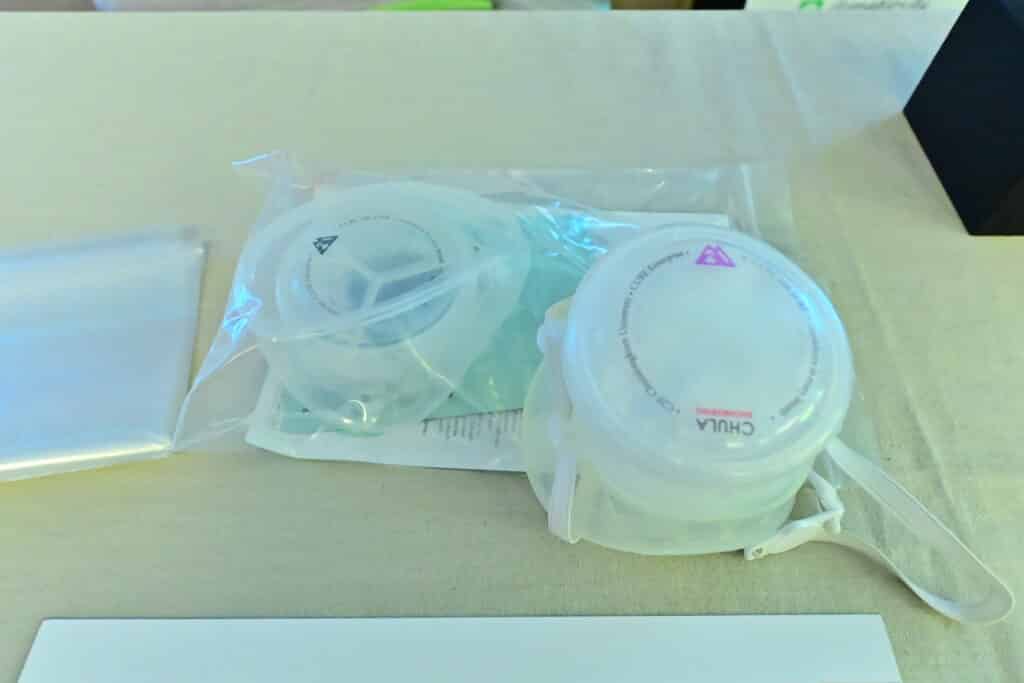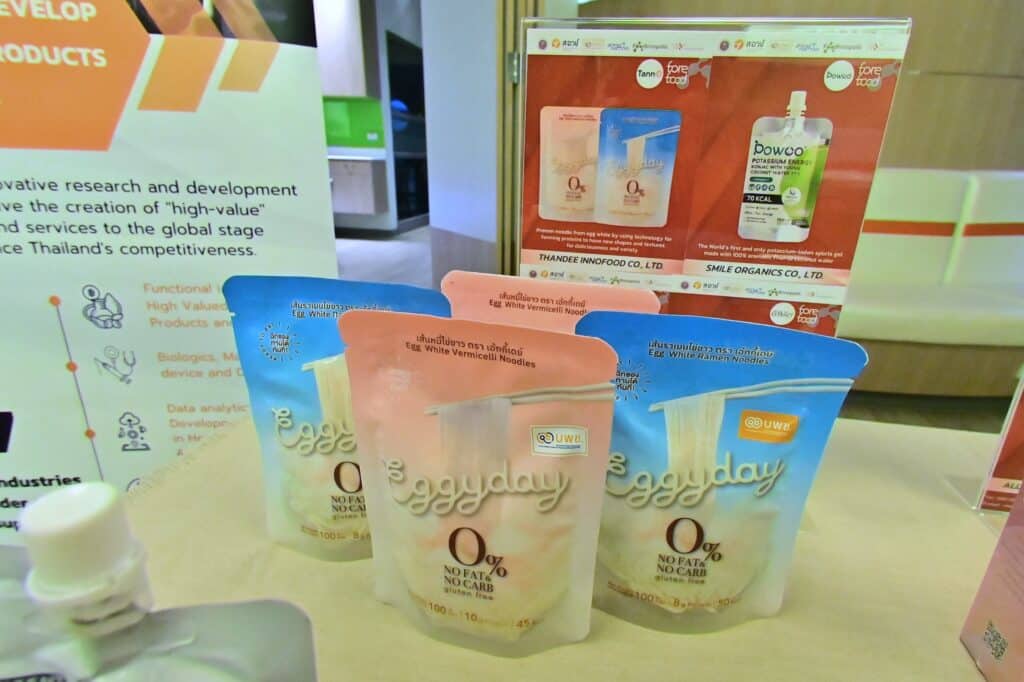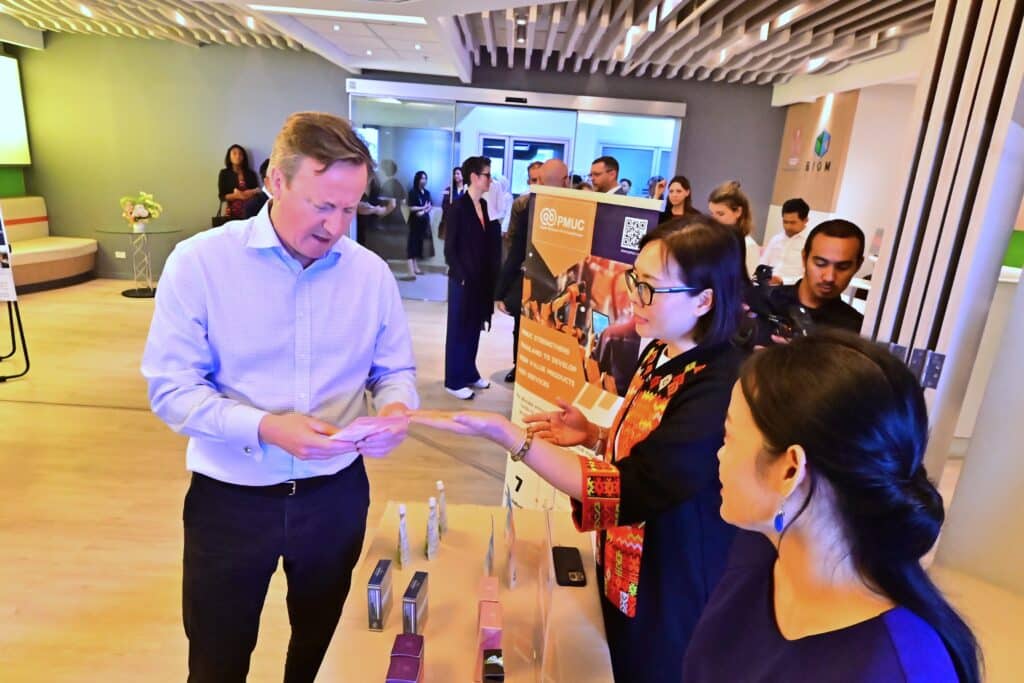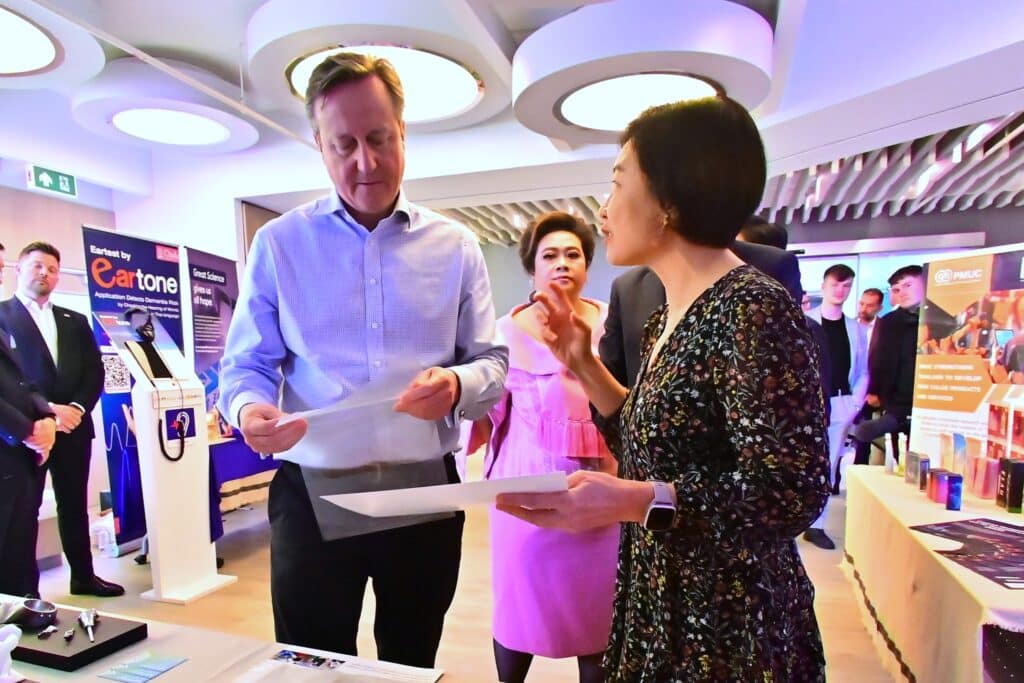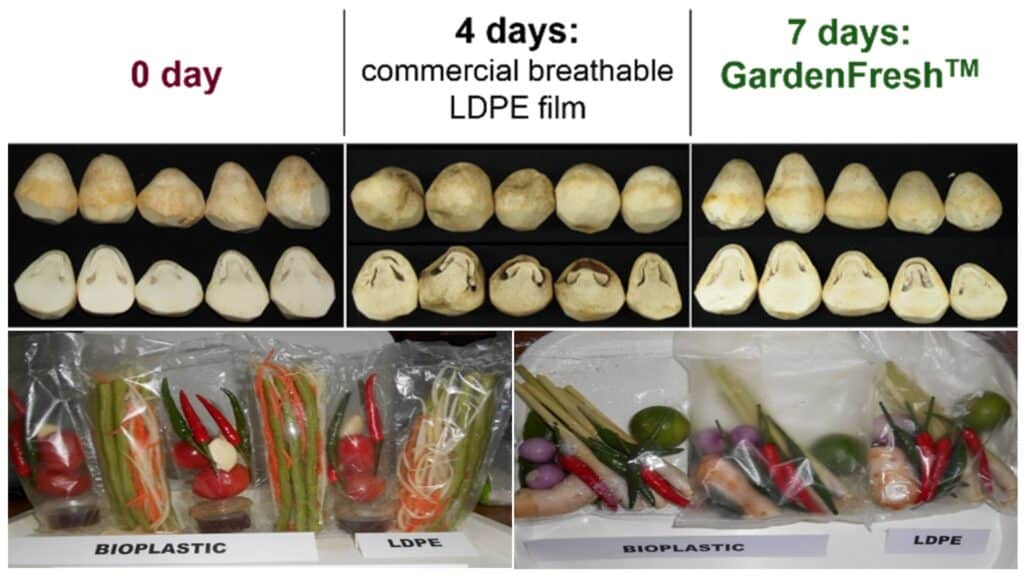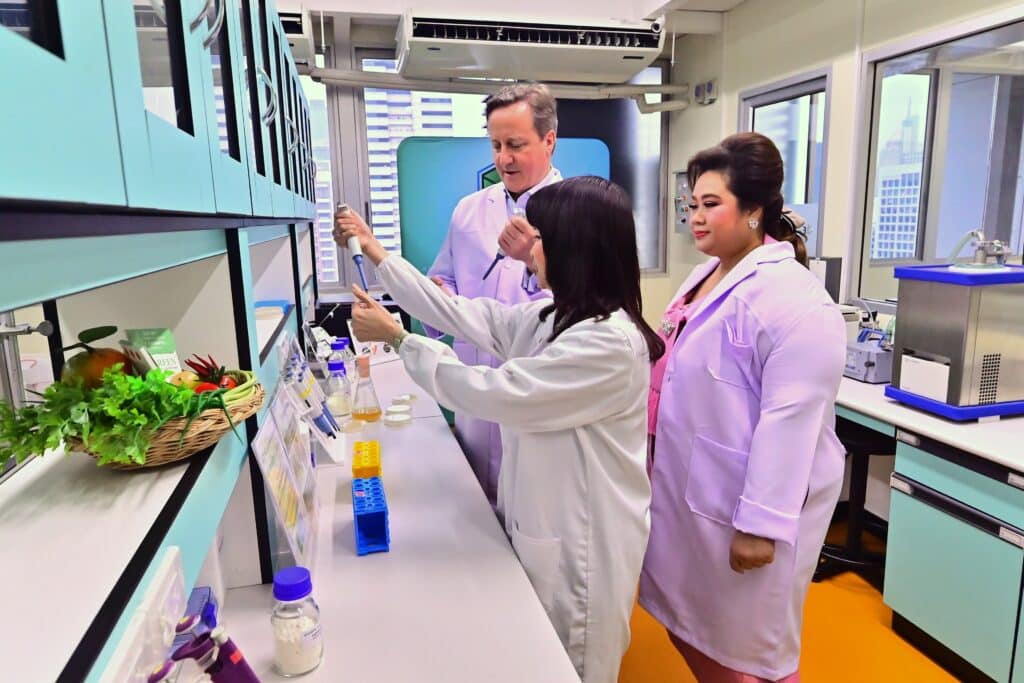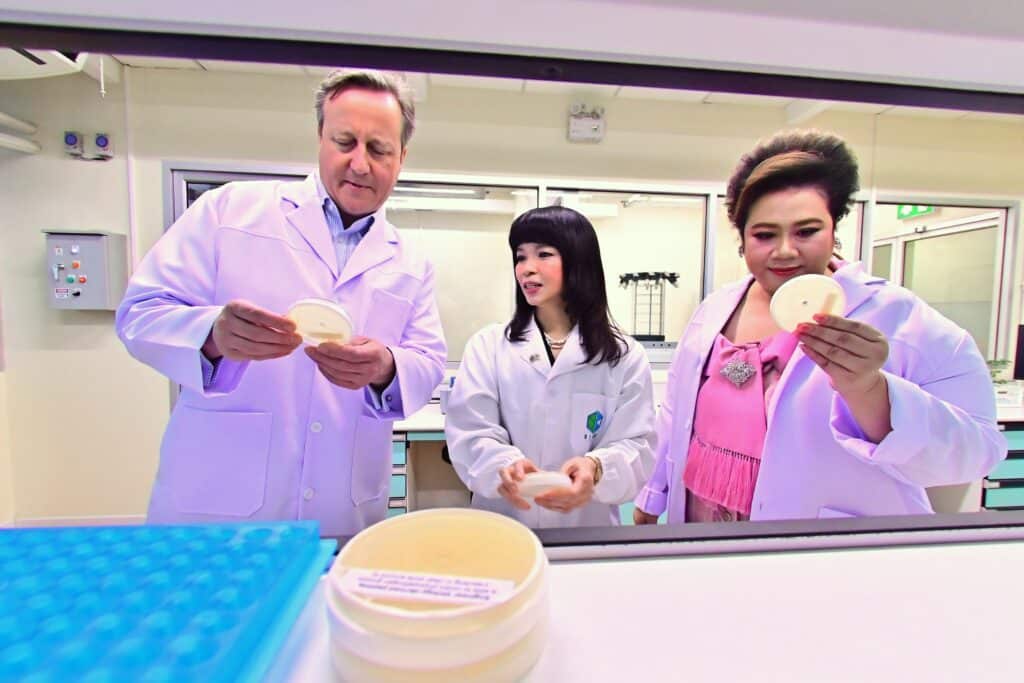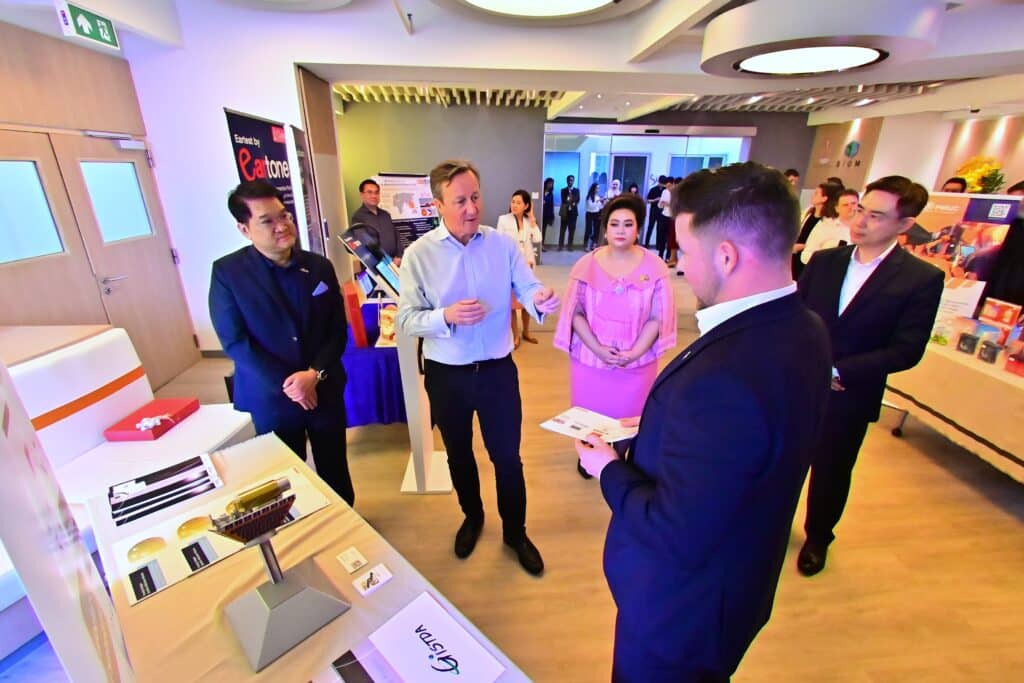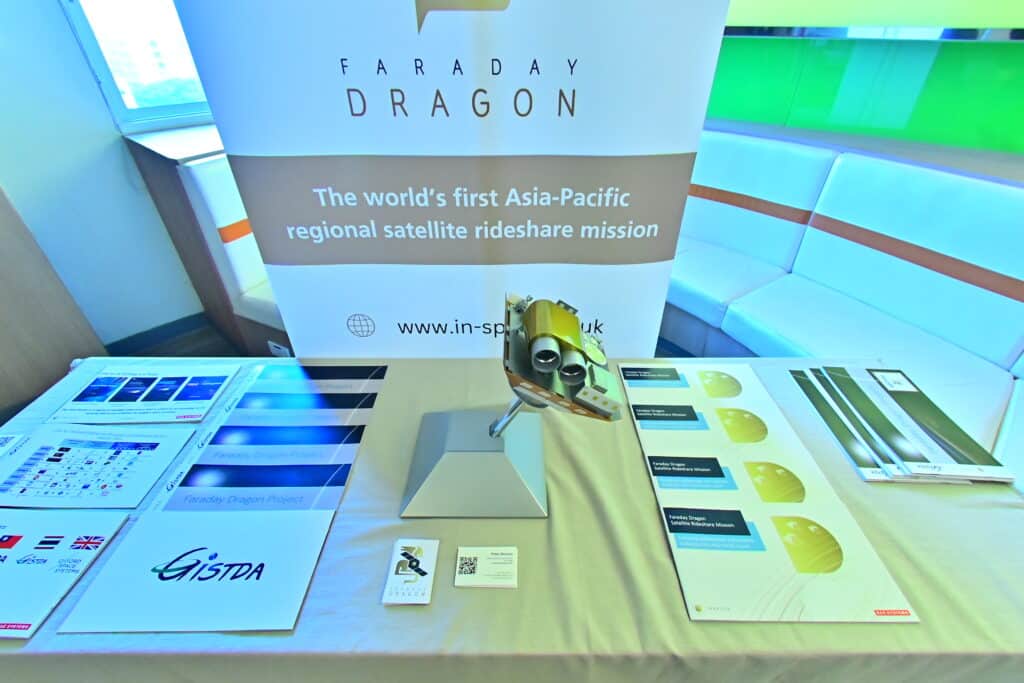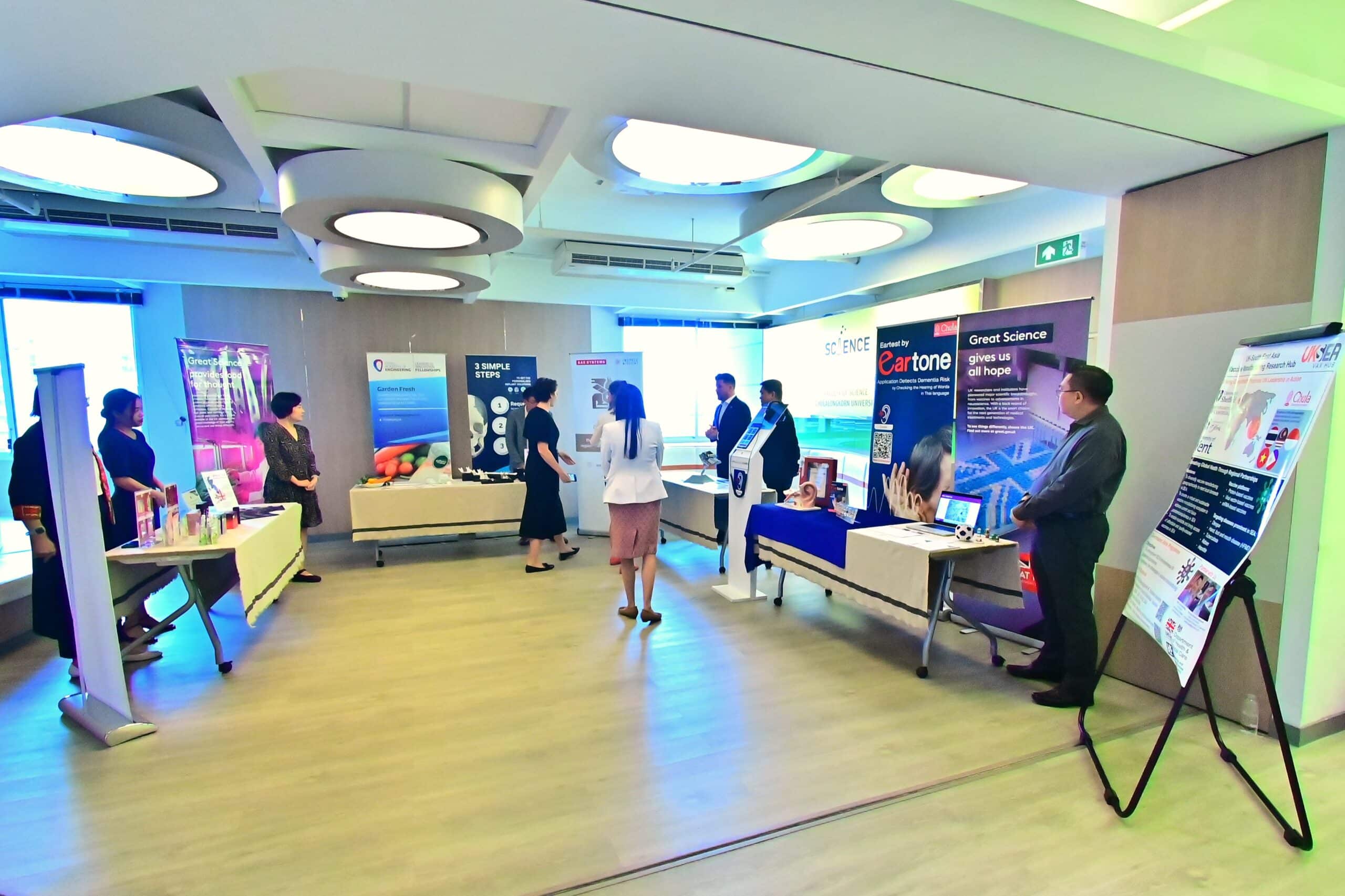
Lord Cameron viewed the exhibition showcasing research and innovations at Chulalongkorn University and gave an interview to Ms. Karuna Buakamsri, PPTV reporter, sharing his perspectives on academic and innovation collaboration between Thailand and Britain. The innovations that were presented in this event included:
Vaccine security and self-reliance in South East Asia
This innovation to develop vaccine security and self-reliance Southeast Asia is the work of Tuck Seng Wong and Prof. Dr. Kiat Ruxrungtham, Faculty of Medicine, Chulalongkorn University. The research is a response to the need for sufficient vaccines and the ability to locally produce them and a preparation for future pandemics. It demonstrates the potential of Southeast Asia to be a world leader in vaccine production, with support from UK-South East Asia Vaccine Manufacturing Research Hub. The development of vaccines in Thailand, namely the HXP-GPOVac, which is in the clinical trial stage, the ChulaCov19, an mRNA vaccine developed by Chulalongkorn Vaccine Research and Medical Development Center (Chula VRC), and Chula-Baiya vaccine by Baiya Phytopharm, a protein subunit vaccine from plant extracts, has shown great progress in Thailand’s vaccine research.
EarTest by Eartone application for hearing testing through words
EarTest by Eartone, an application to test hearing with Thai words, indicating a risk of dementia is developed by Dr. Nattawan Utoomprurkporn, Faculty of Medicine, Chulalongkorn University, as part of the collaboration between the private sector, Chulalongkorn’s Faculty of Medicine and Faculty of Science, and the University of London. The research received its funding from the Transforming Systems through Partnership to promote collaboration between universities and the private sector via the Royal Academy of Engineering, Great Britain, and Program Management Unit for Competitiveness (PMUC) under the supervision of Office of National Higher Education Science Research and Innovation Policy Council (NXPO).
This innovation revolutionizes the method of hearing testing at the level of brain interpretation using modern technology, which helps provide faster diagnosis and prevention of disease. The application is available for free downloads on both iOS and Android, making it one of the innovations that reflects the great strides Thailand is making toward becoming a medical hub of Southeast Asia.
Artificial skulls, faces, and jaws with 3D printing technology
Chulalongkorn University and Meticuly, headed by Asst. Prof. Dr. Chedtha Puncreobutr, Metallurgical Department, Faculty of Engineering, Chulalongkorn University,have developed artificial bones from 3D printing for skulls, faces, and jawbones. With high precision production process, the innovation aims to meet the specific needs of patients and has been used by over 100 patients with satisfactory results. In the future, more possibilities of 3D printing in making artificial bones will be explored.
CUre Air Sure masks
CUre Air Sure, an innovative mask to prevent all kinds of pollution, developed by Prof. Dr. Anongnat Somwangthanaroj and a research team from the Department of Chemical Engineering, Faculty of Engineering, Chulalongkorn University, is a collaborative effort with SCG Packaging and leading industries to alleviate the shortage of medical face masks in Thailand. The mask can filter up to 99% of 0.1-micron particles, equivalent to an N95 mask. In addition to the filtering properties, the mask is designed to be comfortable, less irritating to the skin, and environmentally friendly. CUre Air Sure received the Good Design Award 2021 from Japan, bringing Thai innovation to the international arena.
Egg white noodle
An innovative health food from 100% egg white protein is developed by Asst. Prof. Dr. Sathaporn Ngamukote, Faculty of Allied Health Sciences, Chulalongkorn University, and received funding from PMUC for production and testing to gain clinical data and file for standards for sale. The project was initially incubated in the CU Innovation Hub before joining the incubation and accelerator program of Food Innopolis, funded by PMUC’s Deep Science and Technology Acceleration Platform to be developed for the market. The egg white noodle is low in calories, flour-free, gluten-free, and contains no preservatives, making it suitable for those who require high protein but with low fat, such as cancer patients, kidney disease patients, diabetic patients, or those who want to control their weight. Apart from being a new alternative to eating protein, it also adds variety in consuming healthy food. The noodle can be used in both savory dishes and desserts; it comes ready-to-cook or can be used to create other dishes as desired. This innovation emphasizes the concept of developing health products that are easy to eat, convenient, and delicious, meeting the health needs of consumers.
Garden Fresh: Life extension bags for fresh fruits and vegetables
Garden Fresh, an innovative bag to extend the life of fresh fruits and vegetables, was developed by Prof. Dr. Anongnat Somwangthanaroj, Faculty of Engineering, Chulalongkorn University. It can help extend the life of fruits and vegetables by 2 – 7 times, while maintaining the freshness and quality of the fruits and vegetables. Using biodegradable plastic, the bag keeps the same aroma, taste, and nutritional value of the fruits and vegetables the same. This innovation not only improves storage efficiency and reduces food loss, but also minimizes waste and promotes sustainable conservation of resources.
M-Green: Vegetable and fruit cleaning enzyme
M-Green fruit and vegetable cleaning enzyme from Biom design is the first and only product in Thailand that can remove up to 80% of pesticides with maximum safety. The product was developed by Prof. Dr. Alisa Vangnai, Department of Biochemistry, Faculty of Science, Chulalongkorn University, who led the team in inventing natural enzymes under the concept of Sustainability farm to save food. The goal is for Thai people to consume safe chemical-free vegetables and fruits. M-Green not only provides cleanliness but also reduces toxicity, ensuring consumers’ good health from eating vegetables and fruits without toxic residues.
GISTDA Faraday Dragon project
Geo-Informatics and Space Technology Development Agency (GISTDA) signed an MOU with Faraday Dragon, a collaboration between In-Space Missions and other Asia-Pacific agencies, to develop a rideshare satellite expected to launch in October 2026. This regional cooperation will help promote space technology and development capabilities in the Asia-Pacific region. It is expected to encourage the development of joint satellite projects in the future and strengthen the relations between Thailand and the United Kingdom in the areas of space technology and space exploration.

